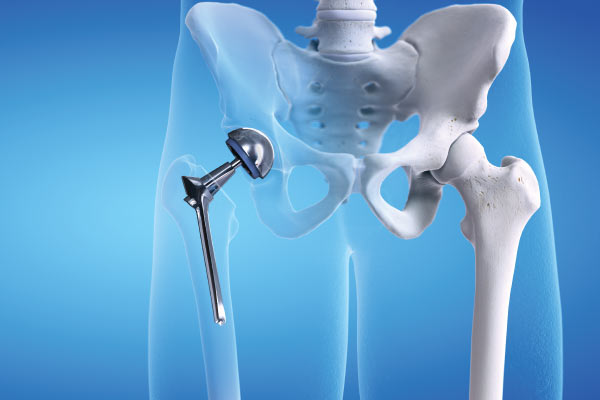
Gurgaon
| Surgery Type | Recovery Days | Hospital Days | Age Group |
|---|---|---|---|
| Total Hip Replacement (THR) | 6 -12 weeks | 2-4 Days | Any age |
| Minimally Invasive Hip Replacement (MIHR) | 2 -6 weeks | 1- 3 days | Any age |
| Anterior Hip Replacement (AHR) | 2 -6 weeks | 1- 3 days | Any age |
| Partial Hip Replacement (PHR) | 6 -12 weeks | 2 -4 days | Typically older adults |

Medical history & examination:
The doctor reviews your pain, daily limitations, and overall health. A physical exam checks hip movement, strength, and alignment.
Imaging tests:
Doctor’s key observations:


 Pristyn Care
Pristyn Care New Delhi , Delhi
New Delhi , Delhi
 Pristyn Care
Pristyn Care Gurugram , Haryana
Gurugram , Haryana
 Pristyn Care
Pristyn Care New Delhi , Delhi
New Delhi , DelhiBest Healthcare Provider for Orthopedic Treatments
Minimally invasive Hip replacement involves a much smaller incision of 4 to 6 inches, unlike traditional Hip replacement, that involves a much longer incision of 8 to 10 inches.
Our Orthopedic Surgeons use the best prosthesis for joint replacement surgeries, such as Johnson & Johnson, Stryker, Zimmer, Smith & Nephew. Usage of the best quality implants for orthopedic procedures in order to promote longevity and durability.
The patient’s physiotherapy preferably begins after 10-12 days of surgery. For your smooth and precise recovery post Hip replacement surgery, we will help you connect with the best Physiotherapist near you.
We offer follow-up consultations with the surgeon and provide instructions for post surgery care including dietary tips and exercises to our patients to ensure they have a smooth recovery.
At Pristyn Care, our orthopedic surgeons specialize in advanced hip replacement surgeries using modern techniques for faster recovery and long-lasting results. Patients receive end-to-end care—from consultation to post-operative support—at transparent and affordable costs.
Pristyn Care is committed to providing world-class hip replacement surgeries at transparent and affordable prices. We help patients understand the cost breakdown clearly so they can make an informed decision. From treatment guidance to complete recovery, our team supports you every step of the way.
At Pristyn Care, we ensure patients get affordable and transparent hip replacement treatment in Gurgaon.
We also assist with health insurance coverage to minimize out-of-pocket expenses.
Our dedicated finance experts guide you through the entire process – from documentation to approval of insurance claims- so that you receive the maximum claim benefits without hassle.
We strive to make the treatment journey smooth, ensuring both patients and their families avoid unnecessary financial stress.
| Do’s | Don’ts |
|---|---|
| Walk a few steps regularly, if comfortable | Don’t sit with crossed legs |
| Follow the exercise routine as advised by the doctor | Avoid bending your hips at a right angle |
| Discuss with your doctor before driving | Avoid sitting on a low chair or a chair without arms, as you may experience difficulty while trying to get up |
| Get back to work only when you’re ready | Avoid jumping and taking sudden turns while recovering |
| Try sitting in a reclining position | Do not lift heavy objects unless advised |
| Sr.No. | Doctor Name | Registration Number | Ratings | Experience | Address | Book Appointment |
|---|---|---|---|---|---|---|
| 1 | Dr. Bhagat Singh Rajput | 48404 | 4.5 | 45 + Years | Pristyn Care Elantis, Ring Road, Lajpat Nagar | Book Appointment |
| 2 | Dr. Kamal Bachani | 5165 | 4.5 | 36 + Years | Pristyn Care Diyos, Safdarjung Enclave, New Delhi | Book Appointment |
| 3 | Dr. Abhishek Kumar | 12212 | 4.5 | 29 + Years | Pristyn Care Elantis Hospital, Lajpat Nagar, Delhi | Book Appointment |
| 4 | Dr. Nikhilesh Singh | 26060 | 4.5 | 22 + Years | Pristyn Care Diyos, Safdarjung Enclave, New Delhi | Book Appointment |
| 5 | Dr. Sumit Kumar | 71546 | 4.5 | 16 + Years | A1/26, adjacent to Green Fields Public School, Safdarjung Enclave, New Delhi, Delhi 110029 | Book Appointment |
| 6 | Dr. Yash Bhatia | HN 24904 | 4.5 | 15 + Years | Pristyn care Sheetla Hospital, New Railway Rd, near Dronoacharya Govt College, Manohar Nagar, Sector 8, Gurugram, Haryana 122001 | Book Appointment |
| 7 | Dr. Rahul Kumar | DMC/R/9614 | 4.5 | 13 + Years | Pristyn Care Diyos, A1/26, adjacent to Green Fields Public School, Safdarjung Enclave, New Delhi, Delhi 110029 | Book Appointment |
| 8 | Dr. Himanshu Bansal | 85834 | 4.5 | 12 + Years | -- | Book Appointment |
| 9 | Dr. Siddharth Bansal | HN 28092 | 4.5 | 11 + Years | Pristyn Care Sheetla Hospital, Sector 8, Gurgaon | Book Appointment |
| 10 | Dr. Abhishek Bansal | DMC/R/2581 | 5.0 | 21 + Years | Express Greens Plaza, Sector 1,Vaishali, Ghaziabad | Book Appointment |
| 11 | Dr. Manu Bora and Team | 51273 | 4.8 | 20 + Years | Pristyn Care La Midas, Main, Nathupur Rd, nr. 38, DLF Phase 3, Sector 24, Gurugram, Haryana 122002 | Book Appointment |
| 12 | Dr. Ashish Taneja | DMC/R/2000 | 4.7 | 22 + Years | Pristyn Care Diyos Hospital, Safdarjung Enclave, Delhi | Book Appointment |
Yes, the cost of hip replacement surgery is covered by both mediclaim and health insurance coverage. However, the coverage is subject to the policy’s waiting period and is given in accordance with the terms and conditions of your health insurance plan. Therefore, it is advised to choose a plan that provides complete protection against a variety of medical costs.
Absolutely, yes. Not only does hip replacement surgery help you reduce the pain and increase mobility, but it also helps the patient return to their daily routine. The recovery is a gradual process that ensures a long-term outcome.
Yes. Physiotherapy is an essential part of the hip replacement recovery process. Physiotherapy begins the same day of the surgery and will be recommended for a few weeks.
Ramandeep Singh
Recommends
My hip replacement surgery was successful and I couldn’t be more happy. Thank you Pristyn care team in Gurgaon for helping me throughout my surgical journey.
Neelam Yadav
Recommends
I had my father’s hip replacement surgery through Pristyn care in Gurgaon. He is very old so requires extra help but the surgeon and hospital they provided did far more than expected. Thank You.
.svg)
.svg)
.svg)